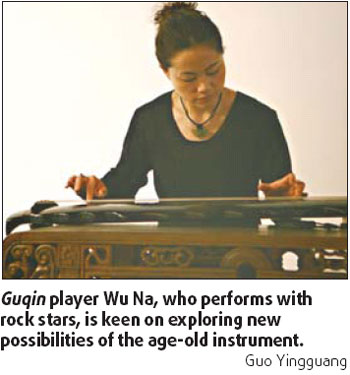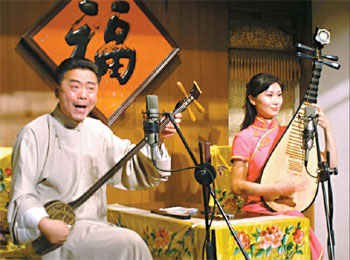Plucked from obscurity
Dozens of foreign ambassadors and their friends gathered at the Sun Shine Gallery in Beijing for a special art show last month. Alongside artists displaying calligraphy, video projection, installation and mouth-watering food, a young lady, Wu Na, played a charming instrument known as guqin.
For thousands of years, the seven-stringed instrument has produced what is regarded as the most elegant form of Chinese music. In 2003, it was listed as an oral and intangible heritage of humanity by the UNESCO.
Wu, 28, has been studying guqin for more than 20 years and graduated with the country's first master's degree in playing guqin a few years ago. She's running the Silk Cotton House (Sitongguan) at the Zhongshan Park near the Forbidden City, where she and her friends play and teach guqin, stage Kunqu Opera and hold lectures about traditional Chinese culture.
But besides Wu's traditional repertoire she also improvises with rock stars, such as Cui Jian and Dou Wei, who have highly praised her talent. Next month, Wu will visit Germany for an international music festival held in Cologne.
"In improvisation I get to share joys and sorrows with my friends - much the same way as ancient Chinese scholars played music together," said Wu. "China is experiencing a flourishing period of artistic thoughts, I'm honored to be one of the people creating a new era."
While Wu is keen on experimenting with new things, more people are attracted by guqin's symbolic status as the cream of ancient Chinese culture.
Sui Zijun, a 10-year-old girl, recently joined masters to perform at the Hall of the Chinese People's Political Consultative Conference in downtown Beijing. Last August, Sui won the gold prize in the national Youlan Cup Guqin Contest held in Tianjin.
Five years ago, she went to the Beijing Youth and Children's Palace in Jingshan Park where she saw students playing guqin and fell in love with it. Sui is but one of the hundreds of students aged between 4 and 80 that Yang Qing has taught over the past decade.
The Vice President of the China's Academy of Guqin has published a textbook with CD recordings and offers smaller instruments, which better suit young learners.
Many guqin masters say they have never seen so many Chinese interested in this ancient art, which was once on the verge of extinction. There are more than 20,000 people in China playing or learning guqin, said Li Xiangting, a professor with the Central Conservatory of Music.
The performance of Suzhou Pingtan is a combination of storytelling and ballad singing. Wang Jiankang |
"Although the country's economy has developed faster than its culture, I am optimistic to see a more rational understanding of our traditional culture taking shape," said Li, who has performed extensively abroad and published improvisational albums based on ancient poetry.
Zeng Chengwei, a leading figure with the Sichuan School of Guqin, went to London last July to share knowledge about Chinese culture with members of the London Youlan Qin Society, which was founded in 2003 by Chinese guqin player Cheng Yu.
Many have been learning guqin for a long time and come from several countries, said Zeng, who has tutored over 10 foreign students in Chengdu, capital of Sichuan Province in Southwest China.
Wang Fei, who founded the North America Guqin Association in San Francisco 10 years ago, said her association has attracted some 2,000 members. "Music is a global language, guqin is a great instrument to promote Chinese culture," said Wang.
Liu Jun
(China Daily 05/23/2007 page19)















